- Home
- Roger Zelazny
Lord of Light Page 2
Lord of Light Read online
Page 2
"Because a world has need of your humility, your piety, your great teaching and your Machiavellian scheming."
"Yama, I'm old," he said. "I'm as old as man upon this world. I was one of the First, you know. One of the very first to come here, to build, to settle. All of the others are dead now, or are gods — dei ex machini. . . The chance was mine also, but I let it go by. Many times. I never wanted to be a god, Yama. Not really. It was only later, only when I saw what they were doing, that I began to gather what power I could to me. It was too late, though. They were too strong. Now I just want to sleep the sleep of ages, to know again the Great Rest, the perpetual bliss, to hear the songs the stars sing on the shores of the great sea."
Ratri leaned forward and looked into his eyes. "We need you, Sam," she said.
"I know, I know," he told her. "It's the eternal recurrence of the anecdote. You've a willing horse, so flog him another mile." But he smiled as he said it, and she kissed his brow.
Tak leaped into the air and bounced upon the bed.
"Mankind rejoices," observed the Buddha.
Yama handed him a robe and Ratri fitted him with slippers.
Recovering from the peace which passeth understanding takes time. Sam slept. Sleeping, he dreamed; dreaming, he cried out, or just cried. He had no appetite; but Yama had found him a body both sturdy and in perfect health, one well able to bear the psychosomatic conversion from divine withdrawal.
But he would sit for an hour, unmoving, staring at a pebble or a seed or a leaf. And on these occasions, he could not be aroused. Yama saw in this a danger, and he spoke of it with Ratri and Tak. "It is not good that he withdraw from the world in this way, now," he said. "I have spoken with him, but it is as if I addressed the wind. He cannot recover that which he has left behind. The very attempt is costing him his strength."
"Perhaps you misread his efforts," said Tak.
"What mean you?"
"See how he regards the seed he has set before him? Consider the wrinkling at the edges of his eyes."
"Yes? What of it?"
"He squints. Is his vision impaired?"
"It is not."
"Then why does he squint?"
"To better study the seed."
"Study? That is not the Way, as once he taught it. Yet he does study. He does not meditate, seeking within the object that which leads to release of the subject. No."
"What then does he do?"
"The reverse."
"The reverse?"
"He does study the object, considering its ways, in an effort to bind himself. He seeks within it an excuse to live. He tries once more to wrap himself within the fabric of Maya, the illusion of the world."
"I believe you are right, Tak!" It was Ratri who had spoken. "How can we assist him in his efforts?"
"I am not certain, mistress."
Yama nodded, his dark hair glistening in a bar of sunlight that fell across the narrow porch.
"You have set your finger upon the thing I could not see," he acknowledged. "He has not yet fully returned, though he wears a body, walks upon human feet, talks as we do. His thought is still beyond our ken."
"What then shall we do?" repeated Ratri.
"Take him on long walks through the countryside," said Yama. "Feed him delicacies. Stir his soul with poetry and song. Find him strong drink to drink—there is none here in the monastery. Garb him in bright-hued silks. Fetch him a courtesan or three. Submerge him in living again. It is only thus that he may be freed from the chains of God. Stupid of me not to have seen it sooner . . ."
"Not really, deathgod," said Tak.
The flame that is black leapt within Yama's eyes, and then he smiled. "I am repaid, little one," he acknowledged, "for the comments I, perhaps thoughtlessly, let fall upon thy hairy ears. I apologize, ape-one. You are truly a man, and one of wit and perception."
Tak bowed before him.
Ratri chuckled.
"Tell us, clever Tak—for mayhap we have been gods too long, and so lack the proper angle of vision—how shall we proceed in this matter of rehumanizing him, so as to best serve the ends we seek?"
Tak bowed him then to Ratri.
"As Yama has proposed," he stated. "Today, mistress, you take him for a walk in the foothills. Tomorrow, Lord Yama conducts him as far as the edge of the forest. The following day I shall take him amidst the trees and the grasses, the flowers and the vines. And we shall see. We shall."
"So be it," said Yama, and so it was.
In the weeks that followed, Sam came to look forward to these walks with what appeared at first a mild anticipation, then a moderate enthusiasm, and finally a blazing eagerness. He took to going off unaccompanied for longer and longer stretches of time: at first, it was for several hours in the morning; then, morning and evening. Later, he stayed away all day, and on occasion a day and a night.
At the end of the third week, Yama and Ratri discussed it on the porch in the early hours of morning.
"This thing I do not like," said Yama. "We cannot insult him by forcing our company upon him now, when he does not wish it. But there is danger out there, especially for one born again such as he. I would that we knew how he spends his hours."
"But whatever he does, it is helping him to recover," said Ratri, gulping a sweetmeat and waving a fleshy hand. "He is less withdrawn. He speaks more, even jesting. He drinks of the wine we bring him. His appetite is returning."
"Yet, if he should meet with an agent of Trimurti, the final doom may come to pass."
Ratri chewed slowly. "It is not likely, though, that such should be abroad in this country, in these days," she stated. "The animals will see him as a child and will not harm him. Men would consider him a holy hermit. The demons fear him of old, and so respect him."
But Yama shook his head. "Lady, it is not so simple. Though I have dismantled much of my machinery and hidden it hundreds of leagues from here, such a massive trafficking of energies as I employed cannot have passed unnoticed. Sooner or later this place will be visited. I used screens and baffling devices, but this general area must have appeared in certain quarters as though the Universal Fire did a dance upon the map. Soon we must move on. I should prefer to wait until our charge is fully recovered, but. . ."
"Could not certain natural forces have produced the same energy effects as your workings?"
"Yes, and they do occur in this vicinity, which is why I chose it as our base—so it may well be that nothing will come of it. Still, I doubt this. My spies in the villages report no unusual activities now. But on the day of his return, riding upon the crest of the storm, some say the thunder chariot passed, hunting through the heavens and across the countryside. This was far from here, but I cannot believe that there was no connection."
"Yet, it has not returned."
"Not that we know of. But I fear . . ."
"Then let us depart at once. I respect your forebodings too well. You have more of the power upon you than any other among the Fallen. For me, it is a great strain even to assume a pleasing shape for more than a few minutes . . ."
"What powers I possess," said Yama, refilling her teacup, "are intact because they were not of the same order as yours."
He smiled then, showing even rows of long, brilliant teeth. This smile caught at the edge of a scar upon his left cheek and reached up to the comer of his eye. He winked to put a period to it and continued, "Much of my power is in the form of knowledge, which even the Lords of Karma could not have wrested from me. The power of most of the gods, however, is predicated upon a special physiology, which they lose in part when incarnated into a new body. The mind, somehow remembering, after a time alters any body to a certain extent, engendering a new homeostasis, permitting a gradual return of power. Mine does return quickly, though, and it is with me fully now. But even if it were not, I have my knowledge to use as a weapon—and that is a power."
Ratri sipped her tea. "Whatever its source, if your power says move, then move we must. How soon?"
Yama
opened a pouch of tobacco and rolled a cigarette as he spoke. His dark, supple fingers, she noted, always had about then: movement that which was like the movements of one who played upon an instrument of music.
"I should say let us not tarry here more than another week or ten days. We must wean him from this countryside by then."
She nodded. "Where to then?"
"Some small southern kingdom, perhaps, where we may come and go undisturbed."
He lit the cigarette, breathed smoke.
"I've a better idea," said she. "Know that under a mortal name am I mistress of the Palace of Kama in Khaipur."
"The Fornicatorium, madam?"
She frowned. "As such is it often known to the vulgar, and do not call me 'madam' in the same breath—it smacks of an ancient jest. It is a place of rest, pleasure, holiness and much of my revenue. There, I feel, would be a good hiding place for our charge while he makes his recovery and we our plans."
Yama slapped his thigh. "Aye! Aye! Who would think to look for the Buddha in a whorehouse? Good! Excellent! To Khaipur, then, dear goddess—to Khaipur and the Palace of Love!"
She stood and stamped her sandal upon the flagstones. "I will not have you speak that way of my establishment!"
He dropped his eyes, and with pain dropped the grin from his face. He stood then and bowed. "I apologize, dear Ratri, but the revelation came so sudden—" He choked then and looked away. When he looked back, he was full of sobriety and decorum. He continued, "That I was taken aback by the apparent incongruity. Now, though, I do see the wisdom of the thing. It is a most perfect cover-up, and it provides you both with wealth and, what is more important, with a source of privy information among the merchants, warriors and priests. It is an indispensable part of the community. It gives you status and a voice in civil affairs. Being a god is one of the oldest professions in the world. It is only fitting, therefore, that we fallen ones take umbrage within the pale of another venerable tradition. I salute you. I give thanks for your wisdom and forethought. I do not slander the enterprises of a benefactor and coconspirator. In fact, I look forward to the visit."
She smiled and seated herself once more. "I accept your well-oiled apology, oh son of the serpent. In any event, it is too difficult to remain angry with you. Pour me some more tea, please."
They reclined, Ratri sipping her tea, Yama smoking. In the distance, a storm front drew a curtain across half the prospect. The sun still shone upon them, however, and a cool breeze visited the porch.
"You have seen the ring, the ring of iron which he wears?" asked Ratri, eating another sweetmeat.
"Yes."
"Know you where he obtained it?"
"I do not."
"Nor I. But I feel we should learn its origin."
"Aye."
"How shall we essay this thing?"
"I have assigned the chore to Tak, who is better suited to the ways of the forest than we. Even now he follows the trail."
Ratri nodded. "Good," she said.
"I have heard," said Yama, "that the gods do still occasionally visit the more notable palaces of Kama throughout the land, generally in disguise, but sometimes in full power. Is this true?"
"Yes. But a year ago did Lord Indra come to Khaipur. Some three years back, the false Krishna made a visit. Of all the Celestial party, Krishna the Tireless does cause the greatest consternation among the staff. He stayed for a month of riot, which involved much broken furniture and the services of many physicians. He did near empty the wine cellar and the larder. He played then upon his pipes one night, however, the hearing of which would have been enough to gain the old Krishna forgiveness for near anything. But it was not the true magic we heard that night, for there is only one true Krishna—swart and hairy, his eyes so red and blazing. This one did dance upon the tables, causing much havoc, and his musical accompaniment was insufficient."
"Paid he for this carnage with other than a song?"
She laughed. "Come now, Yama. Let there be no rhetorical questions between us."
He snorted smoke.
"Surya, the sun, is now about to be encompassed," said Ratri, staring out and upward, "and Indra slays the dragon. At any moment, the rains will arrive."
A wave of grayness covered over the monastery. The breeze grew stronger, and the dance of the waters began upon the walls. Like a beaded curtain, the rain covered that open end of the porch at which they stared.
Yama poured more tea. Ratri ate another sweetmeat.
Tak made his way through the forest. He moved from tree to tree, branch to branch, watching the trail below him. His fur was moist, for the leaves shook small showers down upon him as he passed. Clouds mounted at his back, but the sun of early morning still shone in the eastern sky and the forest was a swarm of colors in its red-gold light. About him, birds were singing from within the tangle of branches, vines, leaves and grasses that stood like a wall upon either side of the trail. The birds made their music, insects hummed and occasionally there was a growl or bark. The foliage was stirred by the wind. Below him, the trail bent sharply, entering a clearing. Tak dropped to the ground, proceeded on foot. At the other side of the clearing he took to the trees again. Now, he noticed, the trail was running parallel to the mountains, even inclining slightly back in their direction. There was a distant rattle of thunder and after a time a new breeze came up, cool. He swung on, breaking through moist spider webs, frightening birds into shrieking flurries of bright plumage. The trail continued to move in the direction of the mountains, slowly doubling back upon itself. At times, it met with other hard-packed, yellow trails, dividing, crossing, parting. On these occasions, he descended to the ground and studied the surface markings. Yes, Sam had turned here; Sam had stopped beside this pool to drink—here, where the orange mushrooms grew taller than a tall man, and wide enough to shelter several from the rains; now, Sam had taken that branch of the roadway; here, he had stopped to fix a sandal strap; at this point, he had leaned upon a tree, which showed indications of housing a dryad. . . .
Tak moved on, about half an hour behind his quarry, as he judged it—so giving him plenty of time to get to wherever he was going and to begin whatever activity so engaged his enthusiasms. A halo of heat lightning reached above the mountains he was now facing. There was another rumble of thunder. The trail headed on up into the foothills, where the forest thinned, and Tak moved on all fours amid tall grasses. It headed steadily upward, and rocky outcroppings became more and more prominent. Still, Sam had passed this way, so Tak followed.
Overhead, the pollen-colored Bridge of the Gods vanished as the clouds rolled steadily eastward. Lightning flashed, and now the thunder followed quickly. The wind came faster here in the open; the grasses bent down before it; the temperature seemed suddenly to plummet.
Tak felt the first drops of rain and dashed for the shelter of one of the stands of stone. It ran like a narrow hedge, slightly slanted against the rain. Tak moved along its base as the waters were unleashed and color deserted the world along with the last bit of blue in the sky.
A sea of turbulent light appeared overhead, and three times spilled streams that rode crazy crescendo down to splash upon the stone fang curving blackly into the wind, about a quarter mile up the slope.
When Tak's vision cleared, he saw that which he did now understand. It was as though each bolt that had fallen had left a part of itself, standing, swaying in the gray air, pulsing fires, despite the wetness that came steadily down upon the ground.
Then Tak heard the laughter—or was it a ghost sound left in his ears by the recent thunder? <.p>
No, it was laughter—gigantic, unhuman!
After a time, there came a howl of rage. Then there was another flash, another rumble.
Another funnel of fire swayed beside the stone fang.
Tak lay still for about five minutes. Then it came again—the howl, followed by three bright flashes and the crash.
Now there were seven pillars of fire. Dared he approach, skirting these things, s
pying upon the fang peak from its opposite side?
And if he did, and if—as he felt—Sam was somehow involved, what good could he do if the Enlightened One himself could not handle the situation?
He had no answer, but he found himself moving forward, crouched low in the damp grass, swinging far to his left.
When he was halfway there it happened again, and ten of the things towered, red and gold and yellow, drifting and returning, drifting and returning, as though their bases were rooted to the ground.
He crouched there wet and shivering, examined his courage and found it to be a small thing indeed. Yet, he pushed on until he was parallel to the strange place, then past it.
He drew up behind it, finding himself in the midst of many large stones. Grateful for their shelter and the cover they provided against observation from below, he inched forward, never taking his eyes from the fang.
He could see now that it was partly hollow. There was a dry, shallow cave at its base, and two figures knelt within it. Holy men at prayer? He wondered.
Then it happened. The most frightful flashing he had ever seen came down upon the stones—not once, or for a mere instant. It was as if a fire-tongued beast licked and licked about the stone, growling as it did so, for perhaps a quarter of a minute.
When Tak opened his eyes, he counted twenty of the blazing towers.
One of the holy men leaned forward, gestured. The other laughed. The sound carried to where Tak lay, and the words: "Eyes of the serpent! Mine now!"
"What is the quantity?" asked the second, and Tak knew it to be the voice of Great-Souled Sam.
"Twice, or none at all!" roared the other, and he leaned forward, rocked back, then gestured as Sam had done.
"Nina from Srinagina!" he chanted, and leaned, rocked, and gestured once more.
"Sacred seven," Sam said softly.
The other howled.
Tak closed his eyes and covered his ears, expecting what might come after that howl.
Nor was he mistaken.

 Seven Tales in Amber
Seven Tales in Amber Frost and Fire
Frost and Fire Doorways in the Sand
Doorways in the Sand Unicorn Variation
Unicorn Variation A Night in the Lonesome October
A Night in the Lonesome October Madwand
Madwand Jack Of Shadows
Jack Of Shadows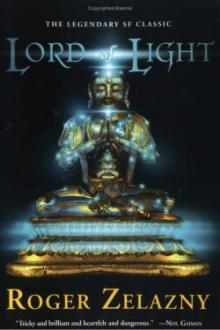 Lord of Light
Lord of Light The Doors of His Face, The Lamps of His Mouth and Other Stories
The Doors of His Face, The Lamps of His Mouth and Other Stories Guns Of Avalon tcoa-2
Guns Of Avalon tcoa-2 Coils
Coils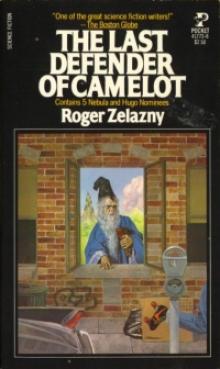 The Last Defender Of Camelot
The Last Defender Of Camelot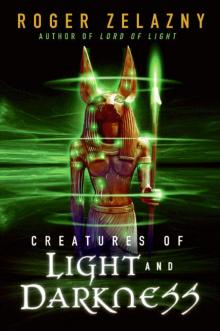 Creatures of Light and Darkness
Creatures of Light and Darkness This Immortal
This Immortal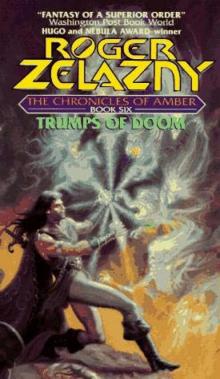 Trumps of doom tcoa-6
Trumps of doom tcoa-6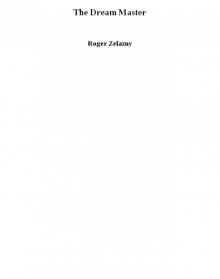 The Dream Master
The Dream Master The Complete Dilvish, The Damned
The Complete Dilvish, The Damned Nine Princes in Amber
Nine Princes in Amber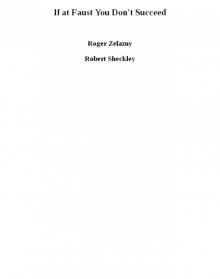 If at Faust You Don't Succeed
If at Faust You Don't Succeed Here there be dragons
Here there be dragons The Doors Of His Face, The Lamps Of His Mouth
The Doors Of His Face, The Lamps Of His Mouth The Great Book of Amber - Chronicles 1-10
The Great Book of Amber - Chronicles 1-10 Madwand (Illustrated)
Madwand (Illustrated)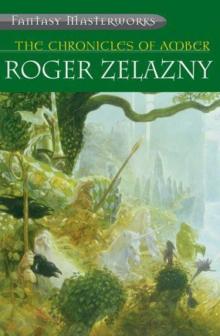 The Chronicles of Amber
The Chronicles of Amber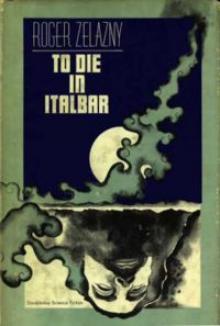 To Die In Italbar
To Die In Italbar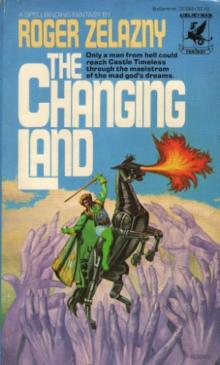 The Changing Land
The Changing Land The Furies
The Furies Nine Princes In Amber tcoa-1
Nine Princes In Amber tcoa-1 Last Of The Wild Ones
Last Of The Wild Ones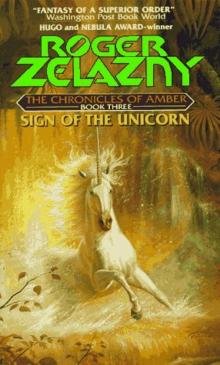 Sign of the Unicorn tcoa-3
Sign of the Unicorn tcoa-3 My Name is Legion
My Name is Legion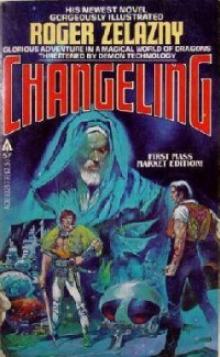 Wizard World 1: Changeling
Wizard World 1: Changeling Changeling
Changeling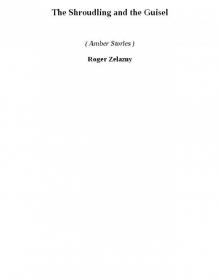 The Shroudling and the Guisel (amber stories)
The Shroudling and the Guisel (amber stories) The Mask of Loki
The Mask of Loki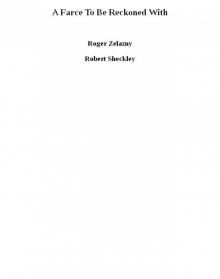 A Farce To Be Reckoned With
A Farce To Be Reckoned With Roadmarks
Roadmarks When Pussywillows Last in the Catyard Bloomed (rtf)
When Pussywillows Last in the Catyard Bloomed (rtf) Hall of Mirrors (amber stories)
Hall of Mirrors (amber stories) Permafrost
Permafrost Changeling (Illustrated)
Changeling (Illustrated) Donnerjack
Donnerjack Shadows & Reflections: A Roger Zelazny Tribute Anthology
Shadows & Reflections: A Roger Zelazny Tribute Anthology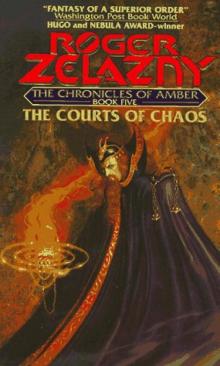 The Courts Of Chaos tcoa-5
The Courts Of Chaos tcoa-5 Flare
Flare Doorsways in the Sand
Doorsways in the Sand The Great Book of Amber
The Great Book of Amber Home Is the Hangman
Home Is the Hangman For a Breath I Tarry
For a Breath I Tarry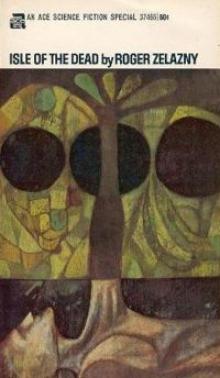 Isle Of The Dead
Isle Of The Dead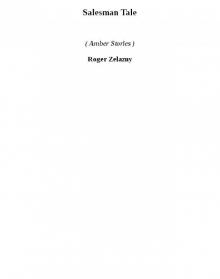 Salesman Tale (amber stories)
Salesman Tale (amber stories) Dismal Light
Dismal Light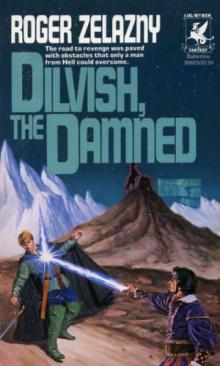 Dilvish, The Damned
Dilvish, The Damned The Black Throne
The Black Throne Wizard World 2: Madwand
Wizard World 2: Madwand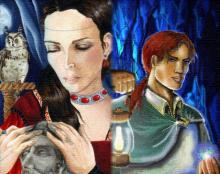 The Salesman's Tale
The Salesman's Tale